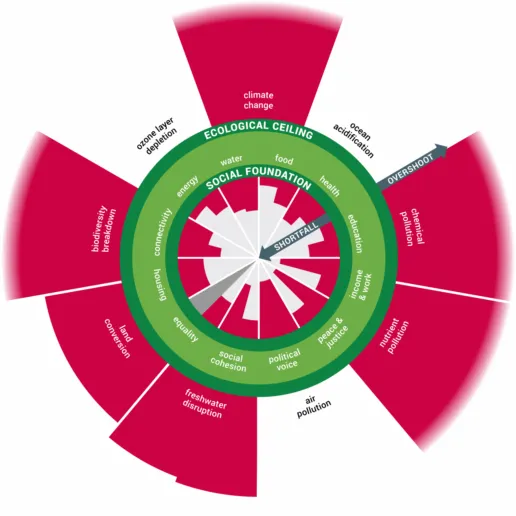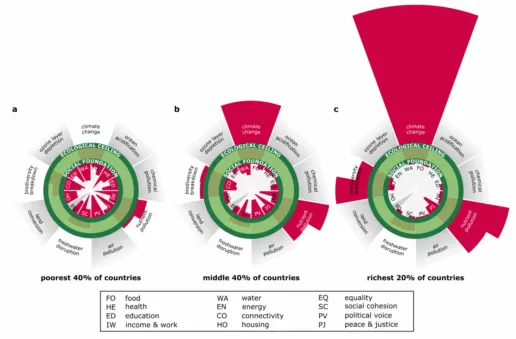For the first time, researchers have created an annual global dashboard that tracks 21st century trends in social shortfall and ecological overshoot, and reveals the extent to which wealthy countries drive most of the overshoot while poorer countries bear the brunt of deprivation.
The co-authors of the study, Andrew Fanning, Research & Data Analysis Lead at Doughnut Economics Action Lab (DEAL) and Visiting Research Fellow at the Sustainability Research Institute at the University of Leeds, and Kate Raworth, Senior Teaching Fellow at the Environmental Change Institute at the University of Oxford, and co-founder of DEAL, analysed trends across 35 indicators from 2000 to 2022 using the “Doughnut” framework of social and planetary boundaries.

They say progress on tackling human deprivation must speed up fivefold to meet global goals by 2030, while ecological damage must reverse at nearly twice the current pace to safeguard a stable planet by mid-century.
Key findings:
- Economic growth has been far outpacing human progress: Global GDP more than doubled, but reductions in human deprivation were modest. At current rates, the world is far off track to eliminate critical shortfalls in food, health, education, and housing by 2030.
- Ecological overshoot has been accelerating: Humanity has breached at least six of nine planetary boundaries. Repairing the damage requires reversing course nearly twice as fast as the current rate of overshoot.
- Stark inequalities: The richest 20% of countries (home to 15% of people) are responsible for over 40% of ecological overshoot, while the poorest 40% (home to 42% of people) experience more than 60% of global deprivation.
The researchers emphasise the urgent need to move beyond GDP as the measure of success and reorient economies to create a “safe and just” future—where social needs are met within Earth’s ecological limits. The Doughnut framework provides a global monitor that will be updated annually for policymakers and societies seeking prosperity without overshooting planetary boundaries.
Dr Andrew Fanning, said: “Our analysis shows that despite rapid global economic growth, humanity is still leaving billions of people in deprivation while pushing Earth beyond its safe limits. The world is out of balance — we urgently need economies designed to deliver both human wellbeing and planetary health.”
"Tracking the Doughnut's global trend reveals a stark reality: the fixation on pursuing endless GDP growth – especially in the richest of countries – is fast driving the world away from, not towards, a thriving future. It is time to focus instead on creating economies that are regenerative and distributive by design, for this will be the hallmark of twenty-first century progress."

Fact File: Country cluster graphics
The richest 20% of countries are responsible for over 40% of ecological overshoot, while the poorest 40% experience more than 60% of global social shortfall.
Country clusters: Researchers grouped 193 countries by average gross national income per capita (2000–2022) into three clusters: poorest 40%, middle 40%, richest 20%.
Social shortfall: Measures the proportion of populations falling below minimum social standards in areas such as food, health, education, housing, energy, and access to services. The poorest 40% bear most of the global social shortfall.
Ecological overshoot: Assesses per capita consumption relative to downscaled planetary boundaries for climate, nutrients, freshwater, and biodiversity. The richest 20% contribute disproportionately to ecological overshoot.
Data year: 2017 (except public transport, 2020). Interactive versions are available on the Doughnut dashboard.
About the Doughnut:
Created in 2012 by Kate Raworth, the Doughnut framework assesses whether humanity meets everyone’s needs within the means of the living planet. The Doughnut consists of two concentric rings: a social foundation, to ensure that no one is left falling short on life’s essentials, and an ecological ceiling, to ensure that humanity does not destabilise the life-supporting systems that sustain all life on Earth. Between these two sets of boundaries lies a doughnut-shaped space that is both ecologically safe and socially just: a space in which humanity can thrive.
The Doughnut monitor will now be updated annually, making it a “report card” for humanity and a key tool that journalists and policymakers alike can use to track global trends in social shortfall and ecological overshoot.